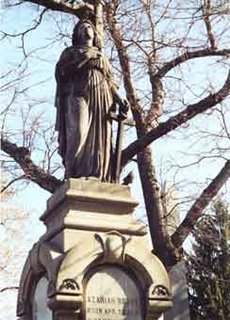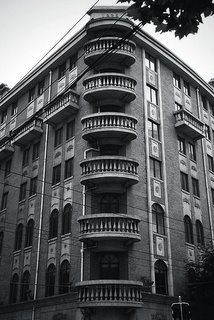One late summer evening while crossing a twilit hill a policeman who had parked his squad car in the lot beside the abandoned train tracks over a high moldering stone wall from the cemetery saw me after closing time and yelled to come over. When I foolishly did he looked at me from head to toe as if I wasn’t real. I didn’t feel quite real myself.
“What are you doing in the cemetery?” he said, with almost savage emphasis on the word. I told him I found it “peaceful.” For some reason he seemed to find this explanation enough and let me go.
I worked throughout much of that period as a bagger at a market not far from where I lived. It was a job as drearily pointless as it sounds – bagger.
I worked there for nearly three years filling untold sacks of paper under seventy watt floresecent lighting. As I bagged I ruminated on the cemetery – the odor of scotch pines around proud family tombs and the grandeur of the purple stained glass windows within, of decaying leaves and autumn afternoons and low wind blown clouds. Usually I dreamed myself back into its black gates. As you can imagine I wasn’t much of an employee.
These flights of fancy were one of the reasons I was dismissed. The other had to do with Eileen whose winter gray eyes and freckled forehead for, some reason, beguiled me.
She worked as the assistant accountant behind the oak door of the manager’s office which a cloud of heavy grey smoke perpetually hung. The nicotine that Mr. Hennessey was addicted to.
“Have you finished your novel yet?” is what he constantly asked, that ridiculous smile on his face, his robin's blue eyes fixed on me like a cat pining an injured bird. He was well aware of my aspirations. But I never attempted any response beyond "...Not yet!” my voice dry as an ash vase.
attempted any response beyond "...Not yet!” my voice dry as an ash vase.
“What are you doing in the cemetery?” he said, with almost savage emphasis on the word. I told him I found it “peaceful.” For some reason he seemed to find this explanation enough and let me go.
I worked throughout much of that period as a bagger at a market not far from where I lived. It was a job as drearily pointless as it sounds – bagger.
I worked there for nearly three years filling untold sacks of paper under seventy watt floresecent lighting. As I bagged I ruminated on the cemetery – the odor of scotch pines around proud family tombs and the grandeur of the purple stained glass windows within, of decaying leaves and autumn afternoons and low wind blown clouds. Usually I dreamed myself back into its black gates. As you can imagine I wasn’t much of an employee.
These flights of fancy were one of the reasons I was dismissed. The other had to do with Eileen whose winter gray eyes and freckled forehead for, some reason, beguiled me.
She worked as the assistant accountant behind the oak door of the manager’s office which a cloud of heavy grey smoke perpetually hung. The nicotine that Mr. Hennessey was addicted to.
“Have you finished your novel yet?” is what he constantly asked, that ridiculous smile on his face, his robin's blue eyes fixed on me like a cat pining an injured bird. He was well aware of my aspirations. But I never
 attempted any response beyond "...Not yet!” my voice dry as an ash vase.
attempted any response beyond "...Not yet!” my voice dry as an ash vase.

